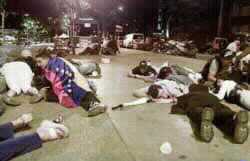At least one gunman opened fire on a Caracas square packed with opponents of Venezuelan President Hugo Chavez on Friday, killing three people as strikers trying to force a change of government cut off the world's fifth-largest source of oil exports. Shots raked the square in Caracas' wealthy Altamira district where military officers opposed to the leftist Chavez have protested for six weeks. Three people were killed and over 20 wounded before police grabbed one suspect, officials said.
One of those killed was a teen-age girl.
The attack on one of the symbolic bastions of resistance to the government came as opposition strikers choked off vital oil exports in a national shutdown that has lasted five days and is aimed at forcing Chavez to accept an early election.
The military dissidents' leader, Gen. Enrique Medina, called on the armed forces to rise up against Chavez.
The army, often ultimate arbiters of power in South America, showed loyalty to Chavez in April, when troops quickly restored him after a revolt by generals who commanded little firepower. There has been no concrete sign since of shifting barracks' allegiances that could endanger the president.
The government said it was horrified by the shootings and did not want them to trigger an escalation of violence.
"The opposition and the government should join hands to confront violence," Vice President Jose Vicente Rangel said.
After a year of almost constant protests and the brief coup in April, the disorganized opposition seemed to have the president on the ropes as the fifth day of the general strike dawned with oil export taps turned firmly off. Chavez was first elected in 1998, six years after leading a coup attempt.
Strike leaders said the protest would continue on Saturday.
TALKS GET NOWHERE
A glimmer of hope of a negotiated settlement flared on Friday as the two sides agreed to meet in a Caracas hotel to discuss resuming formal peace talks, which had ground on without result for three weeks before collapsing on Saturday.
Cesar Gaviria, general secretary of the Organization of American States, struggled to persuade the two sides to sit down together as world oil markets shuddered at the appearance of Venezuela's sudden oil drought just as the United States prepares for possible war in the Middle East.
The president says the constitution rules out a referendum before August and has accused the opposition of trying to stage a repeat of the coup that briefly ousted him in April.
World oil prices rose further on Friday morning before easing at the announcement the government and opposition would discuss resuming peace talks. International benchmark Brent crude oil slipped 35 cents to DLRS. 25.45 a barrel.
Energy Minister Rafael Ramirez said the port bottleneck had cut crude oil production by 400,000 to 500,000 barrels a day, or up to a sixth of total national output.
Economists said that while Chavez could hold out for a while, a prolonged oil stoppage would soon take its toll.
Oil provides 80 percent of exports and 50 percent of government revenues in a country already in steep recession.
The State Department, which has denied accusations it encouraged April's coup leaders, said it was monitoring the situation closely and hoped for a negotiated settlement.
Chavez, whose populist style makes wealthier Venezuelans apoplectic but wins him support among the poor majority, has come back slugging in the past. The president, jailed after leading a coup attempt in 1992, has not declared a state of emergency.
While his support has sunk, Chavez's popularity rating of about 30 percent is still higher than that of any figure in the determined but fractious opposition.
PHOTO CAPTION
People lay on the ground after shots were fired in a plaza in Caracas December 6, 2002. At least two people were killed and several injured when a hail of shots were fired in a square in eastern Caracas where military officers opposed to leftist President Hugo Chavez have staged a protest for more than six weeks. (Daniel Aguilar/Reuters)
- Author:
& News Agencies - Section:
WORLD HEADLINES


 Home
Home Discover Islam
Discover Islam Quran Recitations
Quran Recitations Lectures
Lectures
 Fatwa
Fatwa Articles
Articles Fiqh
Fiqh E-Books
E-Books Boys & Girls
Boys & Girls  Articles
Articles










